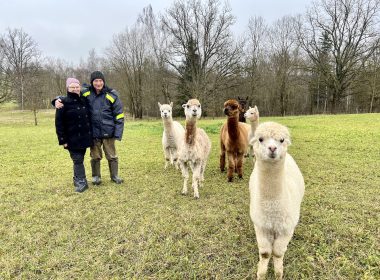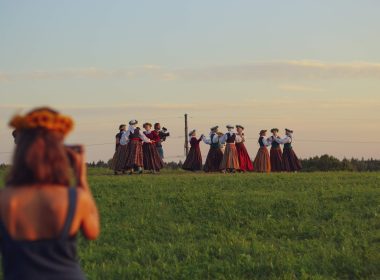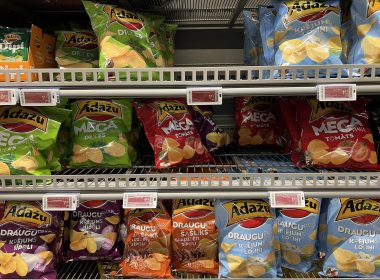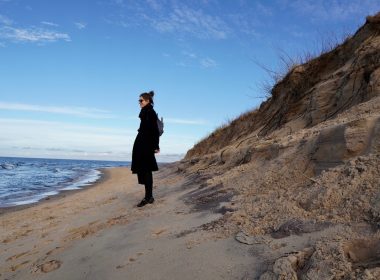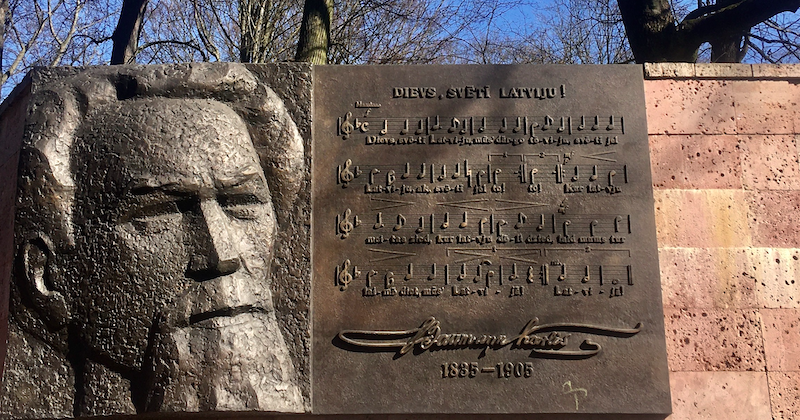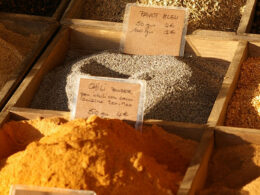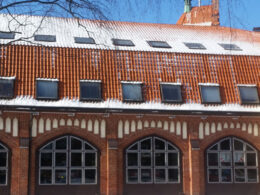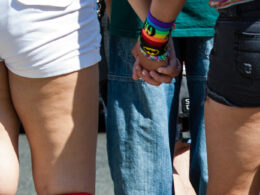I was born in Australia to Latvian parents. Through music, films and stories they, my grandparents and wider community raised me to be and identify as Latvian. That cultural education sure helped adapt to life in the ‘Land that sings’* when we eventually moved when I was seven.
At school in Latvia we sang to mark special occasions, compulsory choir was a thing and we’d pick apart lyrics to find their hidden meaning. Through it all we learnt about the Singing Revolution and other key moments in local history. Of course, as we got older, music became something through which we bonded and found likeminded people.
While living abroad again, I experienced first hand how the lack of these shared cultural experiences can make it hard to feel like you belong. At public events like the Carnaval de Binche in Belgium I was a mere bystander, an onlooker trying to make sense of what was going on around me. I was grateful to my local colleagues for taking the time to explain the tradition.
If you identify with the sentiment, are moving to Latvia or live with a Latvian, this post aims to provide insight through song. I asked some locals to share an iconic song worth listening to to help understand the context of Latvia and its people, and fit into a Latvian crowd. They’re people whose day-to-day is telling Latvia’s story through music, words, pictures or personal passion. Enjoy the musical journey!
Arvīds Barānovs, Photographer and Videographer, Eaglewood Pictures
Raimonds Tiguls and Nora Ikstena, Dod, Dieviņi (God, Give)
The song speaks of the ancient Latvians who we’ve sort of neglected these days. It touches on our roots and our ancestors’ way of turning to the gods (not the Christian one!) for support in helping others and getting things done, rather than boosting one’s ego. And, of course, it just sounds epic at the Song and Dance Festival.
Jānis Žilde, Deputy Editor of TVNET, Music Journalist and Band Member of Satellites LV
Nejautā, 60tie (The 60s)
Two new bands appeared on the Latvian pop scene in the early 90s. One is Prāta Vētra (Brainstorm) founded by a group of schoolmates from Jelgava who wore ragged jeans and oversized shirts, and played simple but heartfelt music. The other is a group of dandies from Riga – Nejautā (Don’t Ask) – who payed close attention to their style, listened to Depeche Mode and Midnight Oil, and stole the hearts of teenage females. At the time, few thought that the small town boys – Prāta Vētra – would gain such popularity. Nejautā had a convincing start. Aigars Grāvers [of cult 80s band Jumprava fame] was their mentor. Under his leadership, the band’s first records sounded incredibly current and potent. This is attested by their track 60tie (60s).
Mārtiņš Eņģelis, Editor-in-Chief, CAPITAL R
Instrumenti, Lēna uguns (Slow Fire)
Sometimes a music video builds on a song in a perfect manner. They create an amalgam that, when separated, completely misses the point. This is the perfect example. In my mind it’s also one of the best combinations of media capable of answering what Latvia sounds like. Latvia can be grey and moody for a long time, but it always sounds like hope. Even when there’s no one around, even when it’s chilly and bleak, even when we shed a tear, we always know things will work out. We’ll rejoice in the victory of dawn over dusk. The beach you see in the video is more or less the same all along its 500 km, and the way the man runs is the way Latvians tend to visit it. Never seeing a stroll by the sea as an extraordinary initiative like many other cultures around the world. It seems that any beach, shore, bank, queue, coast, even when scattered around the country and far from the sea, still has enough space for each of us, the world’s infamous introverts. So, even when grey and moody for a long time, any waterfront still sounds like hope – warming up on a “slow fire”.
Zane Šūpulniece, Tour Guide
Selga Mence and Agris Pilsums, Kur tu biji, bāleliņi (Where Were You Brother)
This song just recently found me and it hit me that it’s exactly what I want to play as I present Latvia on my tours. It happened during a seminar on Enneagrams [personality types]. As it turns out, types can apply both to individuals and larger groups, even nations! Indeed, there are characteristics which are most noticeable at times of stress or specific circumstances. It’s amazing what we, Latvians remember of ourselves when thinking of the Barricades in 1991 – we were so self-aware, so united, pooling all our resources. Everyone joined because we felt we had to. Similarly, we think of the Song and Dance Festivals when people spend so much time at rehearsals and on their feet. It all results in that very, very special feeling of being united and being sure that we’re doing exactly what we have to in that moment.
I think we’ll look back at the coronavirus lockdown with similar feelings. Apparently, those who are sceptical in their daily lives while also loyal on a higher level, playing their individual part in a grander story, belong to the Enneagram type 6. As I listened to this song in that context, a special feeling washed over me. It was that beautiful, noble but modest Latvian spirit. Even without understanding the lyrics I hope listeners will pick up on the amazing sense of people’s togetherness and resilience which we’re once again invited to experience and partake in right now.
Juris Beņķis, Translator and Cēsis Tour Guide
Jumprava, Ziemeļmeita (Daughter of the Northern God)
All of Latvia is here! The lady of the title is a legendary character from a 1904 folk tale. Written in 1988, as the ‘Land that sings’* neared independence, it stands up against any post-punk, new romantic electronica of the period. It remains one of those classic songs that is frequently on the radio, and that Latvians get up and dance to.
Grieta Pīrāga, Music Therapist
Aleksandrs Būmanis and Rūdolfs Blaumanis, Cik blēdīgi tie vecāki (How Crafty the Parents Who)
Cik bēdīgi tie vecāki (How Sad the Parents Who) or, originally, Cik blēdīgi tie vecāki is one of many songs from the legendary Latvian play Skroderdienas Silmačos (Tailor Days at Silmači) written in 1901 by Rūdolfs Blaumanis. These days, the term skroderis (tailor) has been replaced with ‘fashion designer’. (Theatre troupes and families perform versions of the play every year at Midsummer – ed.)
The song addresses how adults use their kids as a helping hand, which remains true to this day. Few of us have escaped some form of labour in our childhoods. The lyrics also reveal how much kids and Latvians in general like to blow things out of proportion. Dakteris (doctor) rhymes with slakteris (slayer) and the singer is quick to give up on love and a future in the face of seemingly petty trauma.
Aleksandrs Safronovs, He Who Finds a Latvian Choir Wherever He Goes
Latvian folk song, Ej, saulīte, drīz pie Dieva
A subtle cry against injustice, the imagery in this one is something else: “On a rock in the middle of the sea, a black serpent is grinding flour. That shall be the meal for those who make us work uncompensated overtime.” Try singing it in the second hour of a conference call…
The father of Latvian academic music, Jāzeps Vītols composed a piano piece exploring the ancient tune. It’s as loaded with history and emotion as a vehicle driven to a vasarnīca vacation – to the brim. (Vasarnīca is a summer cottage. Many Latvian families have one or access to one through friends – ed.)
Tip: If you arrange this song to dark minimal techno, you’ll be granted the title of honorary Latvian and awarded a bag of griķi [buckwheat. The number one item to disappear off supermarket shelves in Latvia during the coronavirus situation].
Ieva Balode, Artist
N. Bumbiere, M. Vilcāne, V. Lapčenoks, O. Grīnbergs, Teic, kur zeme tā (Say, Where Is That Land)
A song which 80s youth grew up on through the film Limuzīns Jāņu nakts krāsā (A Limousine the Colour of Midsummer’s Eve) and self-recorded tapes you’d listen to on Zhiguli-brand car journeys along dusty rural roads with friends and family. Its slightly sentimental, nostalgic lyrics lead us to reflect on those parts of our Latvianness which relate to the breaks in the fog, blooming bentgrass and singing stones [referenced in the lyrics]. Nora Bumbiere and Viktors Lapčenoks’s voices are deeply imprinted on every Latvian’s consciousness. The song describes the nostalgic yet poetic and, of course, patriotic Latvian who grew up in the 80s.
Liāna Beņķe, Cultural Manager and Anthropologist
Dzeltenie Pastnieki, Nāc ārā no ūdens (Come Out of the Water)
Dzeltenie Pastnieki (The Yellow Postmen) are one of the most weird and wonderful Latvian bands from the 80s. Today’s young artists and hipsters still listen to their new wave and synth pop tunes. This nonsensical song from the classic Bolderājas dzelzceļs (Bolderāja railway) album was one of my favourites as a kid thanks to my parents (yes, also Lelde’s parents – they have a lot to answer for) who played it in the car on long drives. For more 80s underground magic check out their close associates NSRD or “Workshop for the Restoration of Unfelt Feelings”.
Imants Kalniņš and Māris Čaklais, Viņi dejoja vienu vasaru (They Danced One Summer Long)
The music of prolific composer Imants Kalniņš is definitely part of the cultural DNA of every Latvian. His are the kind of songs you’ll hear sung around campfires in the early hours of the morning, because the melodies are so well-known; sentimental without straying into the saccharine. With lyrics by poet Māris Čaklais, this song is a tender, bittersweet evocation of a doomed summer romance (some even say Andrew Lloyd Webber copied it for his hit Memory from Cats). This is the original performance from the wonderful 1967 Latvian new wave film Četri balti krekli (Elpojiet dziļi…) (Four White Shirts (Breathe Deeply)), while another definitive version is by Kalniņš’ band Menuets.
Monta Lūsare, Tourism Professional
Prāta vētra, Tavas mājas manā azotē (Under My Wing (Is Your Sweet Home))
It’s one of our homegrown supergroup’s first songs, known by every Latvian. Light listening with folky undertones from the accordeon. The words tavas mājas manā azotē bring up patriotic thoughts of our little Latvia. You can also find an English language version of the song!
Aleksandrs Safronovs, Closeted Graphomaniac
Prāta Vētra, Šo dziesmu es dziedāšu tev (I’ll Sing This Song For You)
You can be a snob about it and insist they never topped this album. Or you can appreciate the homoerotic undercurrent in the narrative. Take a swab at the lyrics with a dictionary. Can you picture it? It’s 1996 and lead singer Renārs Kaupers is twice as cute as Liam Gallagher on half the drugs, while some in Latvia are beginning to get ideas (albeit still in private) – if you’re living free, might as well be loving free.
Selga Beņķe, English Language Tutor
Mārtiņš Brauns, Saule, Pērkons, Daugava (Sun, Thunder, Daugava River)
A rousing choral piece to be heard – and noticed – at large public events here. Listening to it at the Song and Dance Festival or elsewhere, you’ll certainly pick up on the emotion expressed, as well as that sense of unifying strength it gives to singers and listeners alike. Words are by the revered Latvian poet Rainis, and music by the much-loved composer, Mārtiņš Brauns.
(A translated version has become one of the anthems of the Catalan independence movement! – ed.)
Liāna Beņķe, Cultural Manager and Anthropologist
Satellites LV, Nekad, Nekad (Never Never)
This Latvian britpop anthem defined the alternative 90s, symbolizing the youthful maximalism of the first Post-Soviet generation that grew up in the cult Pulkvedis club in Vecrīga. Finally, there were no more borders between East and West. The video is also an authentic slice of 90s Riga globalisation, even featuring the first local McDonalds. The band has undergone several reincarnations since then, but this song is still a live favourite at summer music festivals.
Brigita Dambe, Lifestyle Blogger, Brigitadambe.lv
Instrumenti & Prāta vētra, Te saule aust (Here the Sun Rises)
Latvians are distinct individualists but together we achieve miracles. In Latvia, we can all experience the sunrises and sunsets. We have exclusive access to nature where we can just be. We have hopes of a fulfilling future. People understand you because they’re just like you. Instrumenti have done an amazing job with their last album Cilvēks (Human). It illustrates us both as individuals and as a whole.
And, finally, my own contributions.
100.debija, Man dimantu nav (I Have no Diamonds)
25 years after its release, this dance anthem unites generations X, Y and Z on the dancefloor. Ultimate 90s listening. Timeless masterpiece.
Varavīksne, Kolosāli (Brilliant)
How did your parents keep you entertained in the car? Mine encouraged singalongs. This was a family favourite. I can’t imagine it was a common choice on Australian motorways. Varavīksne (Rainbow) was a rock band that played in the 70s and 80s. Kolosāli is one of their greatest hits and talks about sibling love and getting what you give.
Čipsis un Dullais, Kad meitene skumst (When a Girl Is Sad)
Friends of a friend casually drop Čipsis un Dullais’ lyrics in conversation, own band shirts and attend their gigs religiously. Turns out, they’re just a small part of the band’s cult following (many of whom – millenials). Fans throw bras on stage. Čipsis un Dullais sing about the seemingly mundane aspects of life peppered with insights on contemporary Latvians. They refer to their style as “new age schlager”. This particular song mentions the pomelo fruit. We say Latvians never show up to a friend’s house or party empty-handed. The pomelo is a popular gift.
I hope these songs reveal something new to you or reinforce what you’ve picked up on already. Thank you for listening! If you’d prefer to listen on Spotify, I’ve made a playlist with the songs that were available. Download here! There are plenty more songs to discover, just let the algorithm guide you and say yes to tracks from Zodiaks, Eolika, Menuets, Turaidas Roze, Pērkons, Pienvedēja Piedzīvojumi, Žoržs Siksna and Raimonds Pauls!
—
Enjoyed this post? Continue with What to Eat in Riga!
*’Latvia. The Land that sings’: Latvia’s tourism brand from 2002 to 2010.


